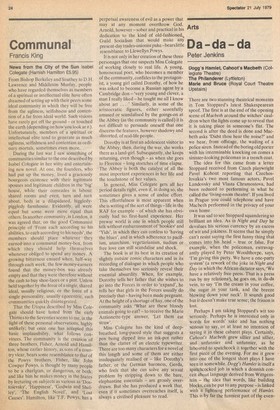Communal
Francis King
News from the City of the Sun Isabel Colegate (Hamish Hamilton £5.95) From Bishop Berkeley and Southey to D.H. Lawrence and Middleton Murtay, people who have regarded themselves as members of a spiritual or intellectual elite have often dreamed of setting up with their peers some ideal community in which they will be free from the ugliness, selfishness and contention of a far from ideal world. Such visions have rarely got off the ground — or touched the earth (depending on how you look at it). Unfortunately, members of a spiritual or intellectual elite tend to generate as much ugliness, selfishness and contention as ordinary mortals, sometimes even more.
During the last war I saw something of communities similar to the one described by Isabel Colegate in her witty and entertaining new novel. At one, the founders, who had put up the money, lived a graciously bourgeois existence with their legitimate spouses and legitimate children in the `big' house, while their comrades in labour shared rooms and even, turn and turn about, beds in a dilapidated, higgledypiggledy farmhouse. Evidently, all were equal but some were more equal than others. In another community, in London, it was agreed that, on the good Communist principle of `From each according to his abilities, to each according to his needs', the members should place whatever they earned. into a communal money-box, from which they should help themselves whenever obliged to spend any money. A growing bitterness ensued when, half-way through each week, the few money-earners found that the money-box was already empty and that they were therefore without the cash to buy shoe-laces or a pint. Unless held together by the force of a single, shared ideal, usually religious, or the force of a single personality, usually egocentric, such communities quickly disintegrated.
That the Utopia described by Miss Colegate should have lasted from the early Thirties to the Seventies seems to me, in the light of these personal observations, highly unlikely; but once one has accepted this basic implausibility, what follows convinces. The community is the creation of three brothers, Fisher, Arnold and Hamilton, whose earlier history, as sons of a country vicar, bears some resemblance to that of the Powys brothers. Fisher, like John Cowper Powys, is thought by many people to be a charlatan, or dangerous, or both; and like him he makes money in the States by lecturing on subjects as various as 'Dostoievsky', 'Happiness', 'Godwin and Shelley', 'The English Novel', and 'Lost Causes'. Hamilton, like T.F. Powys, has a perpetual awareness of evil as a power that may at any moment overthrow God. Arts Arnold, however — sober and practical in his dedication to the kind of old-fashioned, Guild Socialism that would make any present-day trades-unionist puke—bearslittle Da dada resemblance to Llewellyn Powys. It is not only in her creation of these three Peter Jenkins personages that one suspects Miss Colegate of working closely to real life. A young, homosexual poet, who becomes a member of the community, confides to the protagonist, a young girl called Dorothy, of how he was asked to become a Russian agent by a Cambridge don — 'very young and clever, a man I really liked — he taught me all I know about art . . . ' Similarly, in some of the aristocratic figures, either scornfully amused or scandalised by the goings-on at the Abbey (as the community is called) it is not difficult to persuade oneself that one discerns the features, however shadowy and distorted, of real-life people.
Dorothy is at first an adolescent visitor to the Abbey; then, during the war, she works there as a land-girl. Subsequently, she keeps returning, even though — as when she goes to Florence — long stretches of time elapse. The Abbey is both the catalyst of all the most important experiences in her life and the touchstone of her values.
In general, Miss Colegate gets all her period details right, even if, in doing so, she sometimes gives a sense of undue effort. This effortfulness is most apparent when she is writing of the sort of things —life in the RAF for example — of which she has obviously had no first-hand experience. Her prewar world is one in which people still talk without embarrassment of `hookies' and 'Yids', in which they can confess to 'having the blues', and in which adherence to pacifism, anarchism, vegetarianism, nudism or free love can still scandalise and shock.
The book is at its best in its creation of slightly outsize comic characters and in its recording of dialogue in which people who take themselves too seriously reveal their essential absurdity. When, for example, Dorothy tells her father that she wishes to go into the Forces in order to 'expand', he tells her that girls in the Forces usually do precisely that — having been made pregnant. At the height of a shortage of hay, one of the community asks 'What are these bloody animals going to eat? — to receive the Marie Antionette-type answer, let them eat straw'.
Miss. Colegate has the kind of deepbreathed, long-paced style that suggests a pen being dipped into an ink-pot rather than the clatter of an electric typewriter. There are too many characters for a novel of this length and some of ' them are either inadequately realised or — like Dorothy's father, or the German baroness, Gerda, who feels that she can solve any sexual problem by stripping down to the bare, elephantine essentials — are grossly overdrawn. But she has produced a work that, even if it sometimes overreaches itself, is always a civilised pleasure to read.


































 Previous page
Previous page